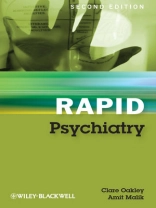This pocket guide is a must for all clinical medical students and junior doctors and provides an excellent revision tool in the run-up to exams. It is also perfect for when working on the psychiatric attachment, as it covers many of the conditions encountered on the wards, in clinics, and in general practice. Now thoroughly updated, it includes new sections on Neuropsychiatry, the Psychiatry of Learning Disability, Forensic Psychiatry, and Psychotherapy, as well as common disorders, their assessment and their treatment. Featuring the key points of the Mental Health Act, along with a glossary of terms,
Rapid Psychiatry is the ideal refresher, covering just the basic relevant facts.
Mục lục
Preface, ix
Acknowledgements, x
List of Abbreviations, xi
Introduction to Psychiatry
Summary, 3
Signs and symptoms, 4
Psychiatric history, 7
Mental state examination, 9
Classification systems for mental disorders, 11
Assessment of suicide risk, 12
Deliberate self-harm, 13
Suicide, 15
Multidisciplinary team, 16
Ethical issues, 17
Mental Capacity Act, 18
Adults With Incapacity (Scotland) Act 2000, 19
Mental health legislation, 20
Differential Diagnosis
The anxious patient, 27
The depressed patient, 28
The elated patient, 29
The hallucinating patient, 30
The patient with obsessions/compulsions, 31
The unresponsive patient, 32
General Adult Psychiatry
Anxiety disorders – agoraphobia, 35
Anxiety disorders – generalised anxiety disorder, 36
Anxiety disorders – social phobia, 37
Anxiety disorders – specific phobia, 38
Chronic fatigue syndrome, 39
Dissociative disorders, 41
Eating disorders – assessment, 42
Eating disorders – anorexia nervosa, 43
Eating disorders – bulimia nervosa, 45
Mood disorders – bipolar affective disorder, 46
Mood disorders – depression, 49
Obsessive-compulsive disorder, 51
Personality disorders, 53
Postnatal mental disorders – postnatal blues, 56
Postnatal mental disorders – postnatal depression, 57
Postnatal mental disorders – puerperal psychosis, 58
Reactions to stressful events – abnormal grief reactions, 59
Reactions to stressful events – acute stress disorders, 60
Reactions to stressful events – adjustment disorder, 61
Reactions to stressful events – post-traumatic stress disorder, 62
Schizophrenia, 64
Somatisation disorder, 67
Substance misuse – assessment, 68
Substance misuse – alcohol, 70
Substance misuse – illicit drugs, 72
Neuropsychiatry
Epilepsy, 77
Head injury and associated psychiatric sequelae, 79
Huntington.s disease, 80
Motor neuron disease, 81
Multiple sclerosis, 82
Parkinson.s disease, 83
Syphilis, 84
Wilson’s disease, 85
Child and Adolescent Psychiatry
Special considerations for assessment, 89
Attachment and development, 90
Attention deficit hyperactivity disorder, 92
Child abuse, 93
Conduct disorder, 94
Other psychiatric disorders of childhood and adolescence, 95
Old Age Psychiatry
Special considerations for assessment, 99
Delirium, 100
Dementia, 102
Depression, 105
Very late-onset schizophrenia, 107
Psychiatry of Learning Disability
Learning disability, 111
Autism, 113
Down.s syndrome, 115
Genetic disorders, 116
Forensic Psychiatry
Special considerations for assessment, 119
Violence and mental disorder, 120
Risk assessment, 121
Structure of forensic services, 122
Legal terms and criminal proceedings, 123
Psychotherapy
Special considerations for assessment, 127
Cognitive-behavioural therapy, 128
Psychodynamic psychotherapy, 129
Supportive psychotherapy, 130
Psychopharmacology
Introduction – general points on prescribing, 133
Antidepressants – selective serotonin reuptake inhibitors, 134
Antidepressants – tricyclic antidepressants, 135
Antidepressants – monoamine oxidase inhibitors, 136
Antidepressants – others, 137
Antipsychotics – atypicals, 138
Antipsychotics – typicals, 139
Antipsychotics – clozapine, 140
Anxiolytics, 141
ADHD medication, 142
Electroconvulsive therapy, 143
Dementia medication, 145
Hypnotics, 146
Medication for alcohol dependence, 147
Medication for opioid dependence, 148
Mood stabilisers – carbamazepine, 149
Mood stabilisers – lithium, 150
Mood stabilisers – sodium valproate, 152
Rapid tranquillisation, 153
Appendices
Culture-specific disorders, 157
Eponymous syndromes, 158
Physical disorders – psychological consequences, 160
Medication – psychological consequences, 161
Glossary
Giới thiệu về tác giả
Clare Oakley is Specialty Registrar in Forensic Psychiatry, Birmingham and Solihull Mental Health Foundation Trust, UK
Amit Malik is Consultant Psychiatrist, Hampshire Partnership NHS Trust, UK












